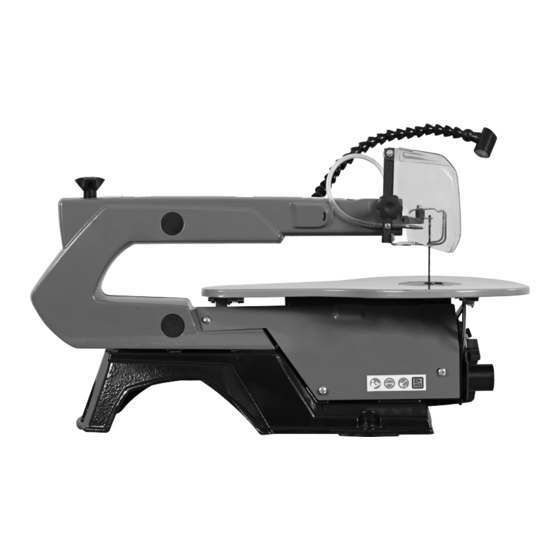djm direct DJMSS406 Betriebshandbuch - Seite 5
Blättern Sie online oder laden Sie pdf Betriebshandbuch für Säge djm direct DJMSS406 herunter. djm direct DJMSS406 19 Seiten. Scroll saw

Do not use the cable for purposes for which it is not
intended. Do not use the cable to pull the plug out of
the outlet. Protect the cable from heat, oil and sharp
edges.
Have your electric tool repaired by a qualified
electrician. This electric tool conforms to the
applicable safety regulations. Repairs may only be
performed by an electrician using original spare parts.
Otherwise accidents can occur.
Work Area & Store Area
Keep the work area orderly. Disorder in the work area
can lead to accidents.
Take environmental influences into account. Do not
expose electric tools to rain. Do not use electric tools
in a damp or wet environment. Make sure that the
work area is well-illuminated. Do not use electric tools
where there is a risk of fire or explosion.
Securely store unused electric tools. Unused electric
tools should be stored in a dry, elevated or closed
location out of the reach of children.
b) Specific Safety Rules
Intended Use
The contents of the instructions must cover not only
the intended use of the machinery but also take into
account any reasonably foreseeable misuse thereof.
Safety Precautions
Connect the dust extraction device. If connections for
dust extraction and a collecting device are present,
make sure that they are connected and used properly.
Operation in enclosed areas is only permitted with a
suitable extraction system.
Additional Safety Rules for Scroll Saws
• This scroll saw is intended for use in dry conditions,
and for indoor use only.
• Do not cut pieces of material too small to hold by
hand outside the blade guard.
• Avoid awkward hand positions where a sudden slip
could cause a hand to move into the blade.
• Always use the blade guard to avoid possible injury
due to blade breakage.
• Never leave the scroll saw work area with the
power, or before the machine has come to a complete
stop.
• Do not perform layout, assembly or set up work on
the table while the cutting tool is in operation.
• Never turn your scroll saw on before clearing the
table of all objects: (tools, scraps of wood, etc) except
for the workpiece and related feed or support devices
for the operation planned.
• Take care of your tools. Keep cutting tools sharp
and clean in order to be able to work better and more
safely. Follow the instructions for lubrication and
for tool replacement. Check the connection cable of
the electric tool regularly and have it replaced by a
recognized specialist when damaged. Check extension
cables regularly and replace them when damaged.
Keep the handle dry, clean and free of oil and grease.
Residual Risks
Despite proper use, additional residual risks cannot
be completely ruled out. The following risks may arise
due to the nature of the Scroll Saw:
Mechanical hazards related to:
Machine parts or workpieces:
• Shape
• Relative location
• Mass and velocity (kinetic energy of elements in
controlled or uncontrolled motion)
• Mechanical strength
• Crushing hazard
• Cutting or severing hazard
• Entanglement hazard
• Drawing-in or trapping hazard
Electrical hazards due to:
• Contact of persons with live parts (direct contact)
• Contact of persons with parts which have become
live under faulty conditions (indirect contact)
• Electrostatic phenomena
Hazards generated by noise, resulting in:
• Hearing loss (deafness), other physiological
disorders (loss of balance, loss of awareness)
• Interference with speech communication, acoustic
signals.
Hazards generated by materials and substances (and
their constituent elements)
processed or used by the machinery
• Hazards from contact with or inhalation of harmful
fluids and dusts
• Fire hazard
Hazards generated by neglecting ergonomic principles
in machinery design related to:
• Unhealthy postures or excessive effort
• Hand-arm or foot-leg anatomy
• Local lighting
• Mental overload and underload, stress
• Human error, human behaviour
• Design, location or identifiation of manual controls
Combination of hazards
Unexpected start up, unexpected overrun/ overspeed
(or any similar malfunction) from:
• Failure/disorder of the control system
• External influences on electrical equipment
• Errors made by the operator (due to mismatch of
machinery with human
characteristics and abilities)
4
